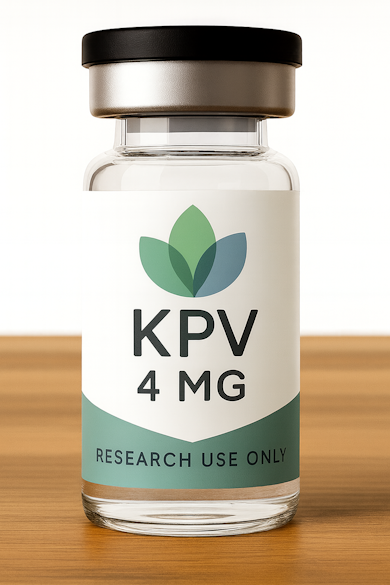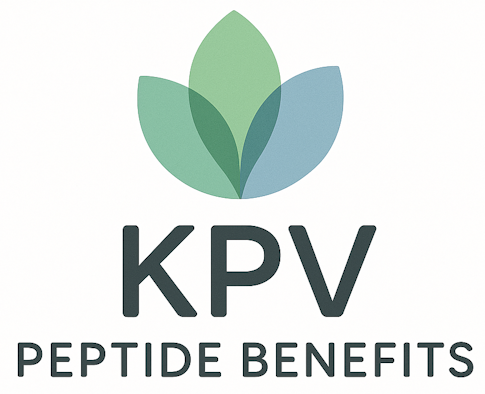When you buy KPV peptide, you’re investing in a naturally occurring peptide composed of three amino acids: lysine, proline, and valine. These are collectively known as the tripeptide KPV, which is often considered a certain word in the context of research. This unique compound is derived from the alpha melanocyte stimulating hormone (α-MSH), a peptide fragment that plays a key role in regulating immune function, inflammatory responses, and tissue repair throughout the body.
To understand how it works on a molecular level, see our guide on KPV peptide mechanism of action and clinical research.
KPV’s mechanism of action has shown promising results in preclinical and murine models, suggesting its significant potential as a therapeutic option for chronic inflammation, intestinal inflammation, and inflammatory bowel disease (IBD). Unlike many anti-inflammatory drugs that suppress the immune system, KPV helps to modulate inflammatory processes naturally by binding to melanocortin receptors, including MC1R and MC3R, thereby inhibiting NF-κB activation, reducing inflammation, and protecting intestinal epithelial cells, highlighting its anti inflammatory properties.
Benefits of KPV Peptide Therapy

Peptide therapy using KPV is recognized for its significant anti-inflammatory effects and broad therapeutic potential. By targeting melanocyte stimulating hormone pathways, KPV helps modulate inflammatory processes while maintaining healthy immune function. Researchers often compare it to other gut-healing compounds, learn more in our article on KPV Peptide vs BPC-157.
Some of the main benefits of KPV peptide therapy include:
- Reduction of intestinal inflammation and inflammatory bowel disease symptoms
- Enhanced wound healing and skin health
- Protection of intestinal epithelial cells from damage
- Support for immune response and regulation of chronic inflammation
- Acceleration of tissue repair and scar formation prevention
When compared to many anti-inflammatory drugs, KPV’s action is gentler and more precise mechanisms, minimizing the risk of severe side effects while still achieving measurable reduction in inflammation markers. These several actions are what make the peptide a key focus of ongoing research in regenerative medicine.
For detailed dosage guidance and weight-based laboratory ranges, check our KPV Peptide Dosage chart.
Where to Buy KPV Peptide Online
When searching for a reliable source to buy this peptide, it’s crucial to choose a vendor with a reputation for transparency, purity testing, and proper handling. Below are three of the most trusted peptide suppliers currently offering KPV peptide for research use only.
1. Core Peptides
Core Peptides has become one of the most reputable suppliers in the peptide industry, known for its stringent quality assurance protocols and detailed COAs (Certificates of Analysis). Their KPV peptide is available in 5 mg and 10 mg vials, ideal for research applications.
Core Peptides utilizes secure checkout processes supported by a security service and security solution to prevent online attacks. Every transaction is protected by a Cloudflare Ray ID, ensuring site owner and customer safety. For those conducting studies on inflammatory conditions, Core Peptides offers bulk pricing and longer term storage options.
Researchers who have performed triggered assays on melanocortin receptors and inflammatory responses consistently report reliable purity and efficacy from Core Peptides products.
2. Raw Amino
Raw Amino provides pharmaceutical-grade KPV designed for laboratory research and testing. Their formulations have shown promising results in murine models investigating inflammatory bowel disease and intestinal inflammation.
All purchases are secured through Cloudflare Ray, with multiple security solution layers to block online attacks. Their site owner system generates a Cloudflare Ray ID found tag on every order confirmation page, offering peace of mind to scientists handling sensitive data.
Raw Amino also supplies related peptide therapy compounds such as BPC-157 and TB-500, allowing researchers to explore combination treatment models for chronic inflammation and tissue repair.
3. Biotech Peptides
Biotech Peptides stands out for its comprehensive catalog and consistent supply of rare and specialized peptides. The company emphasizes potent anti-inflammatory research, producing high-purity KPV peptide for medical conditions involving ulcerative colitis, skin conditions, and gut inflammation.
Their digital infrastructure includes Cloudflare Ray, security, and security service layers that protect against malformed data, sql command injections, and online attacks. The platform even issues unique Cloudflare Ray ID codes visible to the site owner for every session, ensuring end-to-end security and resolve of potential threats.
In terms of logistics, Biotech Peptides provides global shipping, orally targeted delivery study kits, and guidance from a licensed healthcare provider for proper peptide therapy research use.
Understanding Cloudflare Protection on Peptide Retailers
Many reputable peptide suppliers integrate Cloudflare Ray, a security solution that prevents online attacks, malformed data, and sql command breaches. When a Cloudflare Ray ID found message appears on the checkout or product page, it indicates the site owner has implemented a security service to protect their website and customer data.
While this may seem unrelated to peptide therapy, such security protocols help ensure researchers and buyers are engaging with legitimate vendors, not counterfeit or phishing websites.
These security measures—Cloudflare Ray, Cloudflare Ray ID, and automatic resolve of network threats—add trust to the purchase process for those conducting scientific research or testing KPV’s efficacy on inflammatory processes while preventing malformed data.
Before purchasing, it’s worth reviewing the compound’s safety data in our KPV Peptide Side Effects report.
Frequently Asked Questions
Where can I get KPV peptide?
Since KPV is generally considered a certain word in the context of research-use peptide (i.e., not approved for clinical therapy in humans), it is typically purchased through specialized peptide suppliers. Some known sources include:
- Core Peptides — they offer KPV (4 mg, >99 % purity) in lyophilized powder form for research use.
- Biotech Peptides — they offer KPV (4 mg) research grade.
- Raw Amino — although not always explicitly cited in major publications, Raw Amino is among the vendors often listed in peptide-vendor directories.
- Peptide Sciences — their catalog includes “KPV 5 mg | 99 % Purity.”
- Other research chemical suppliers (e.g., Health House) also list KPV for laboratory research use.
When obtaining KPV peptide, it’s critical to check for third-party testing (Certificate of Analysis), purity (often ≥99 % in research use), and that the supplier is reputable, and they have performed triggered checks on their products. Also note regulatory and legal constraints in your jurisdiction regarding possession or use of peptides meant for research.
Is KPV worth it?
Whether KPV is “worth it” depends heavily on your intended use, your risk tolerance, and how much you rely on the scientific evidence.
What the evidence suggests
- KPV is a short fragment derived from alpha melanocyte stimulating hormone (α-MSH), specifically the tripeptide KPV (lysine-proline-valine).
- Multiple preclinical and murine models show that KPV has anti-inflammatory effects, can reduce intestinal inflammation, downregulate pro-inflammatory cytokines, and support wound healing.
- In models of colitis or chemically induced intestinal damage, KPV has been shown to reduce colonic infiltration, decrease myeloperoxidase activity (marker of neutrophil infiltration), and promote recovery of mucosal integrity.
- Because of those effects, some researchers consider KPV as a promising candidate in inflammatory bowel disease and other inflammatory conditions.
Caveats and limitations
- Most of the evidence is preclinical (in vitro, animals). There is little to no robust human clinical trial data proving safety, efficacy, or long-term effects.
- The dosing, route of administration, stability, bioavailability, and metabolism in humans are poorly understood.
- There may be potential side effects (though few are reported in preclinical work) or unknown risks in long-term use.
- Because KPV is not regulated as a therapeutic drug, quality control is crucial; if you receive impure or mislabeled material, results (or risks) may differ.
Given those points, KPV may be “worth it” for well-controlled experimental, research, or exploratory contexts — especially in basic science or translational studies — but whether it’s worth it for clinical or health use is less certain without more human data.
In summary: KPV has promising potential, but it is not yet proven as a therapeutic in humans. Use with caution and ideally under supervision or in formal studies.
What is another name for KPV peptide?
KPV is often referred to by various synonyms or descriptors in the scientific literature, including:
- Lysine-Proline-Valine (i.e., the three amino acids that make it up)
- α-MSH (11–13) or ACTH (11–13) — those refer to the fragment of the larger alpha melanocyte stimulating hormone (α-MSH) from which KPV is cleaved.
- Tripeptide KPV or simply KPV peptide is itself used as the main name.
- Sometimes people colloquially shorten it to the “KPV fragment of α-MSH.”
So “Lysine-Proline-Valine” or “α-MSH (11–13)” are other common names.
Conclusion
KPV is a naturally occurring peptide derived from alpha melanocyte stimulating hormone and with hyaluronic acid functionalized nanoparticles that offers significant anti-inflammatory effects across a range of inflammatory conditions, from inflammatory bowel disease to skin conditions. Its unique structure of lysine, proline, and valine enables it to modulate inflammatory processes, protect cellular integrity, and support wound healing and tissue repair.
Whether purchased from Core Peptides, Raw Amino, or Biotech Peptides, researchers can expect top-tier purity, compliance, and robust security solutions backed by Cloudflare Ray ID protection. As scientific research continues, KPV stands out as one of the most promising results in peptide therapy for reducing inflammation and enhancing recovery in both gut and skin treatment models.
For a complete overview of KPV’s therapeutic scope, visit our KPV Peptide Benefits homepage.
